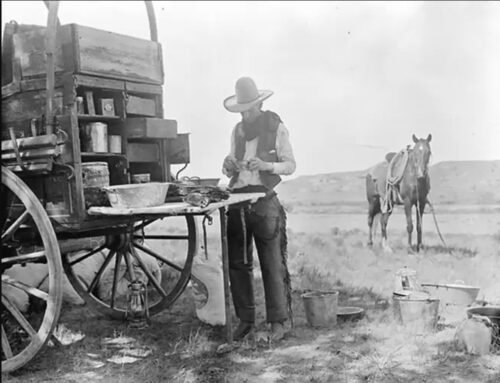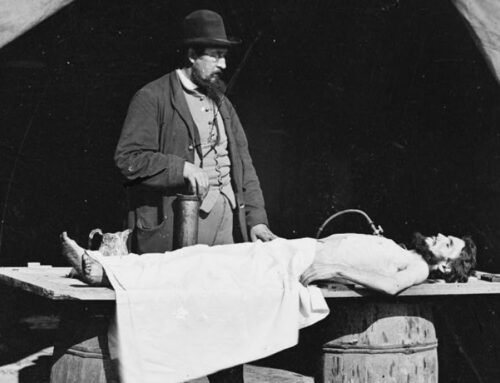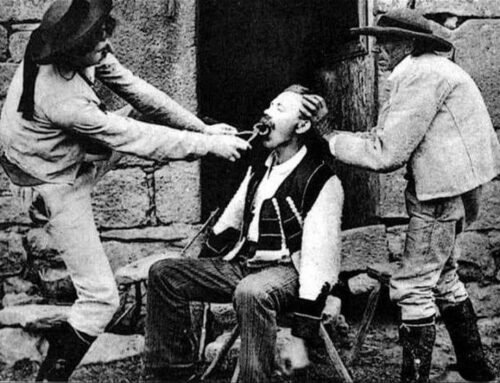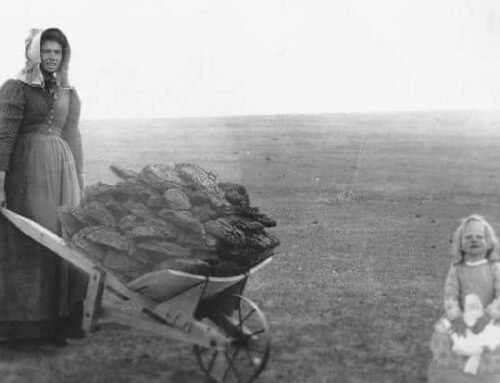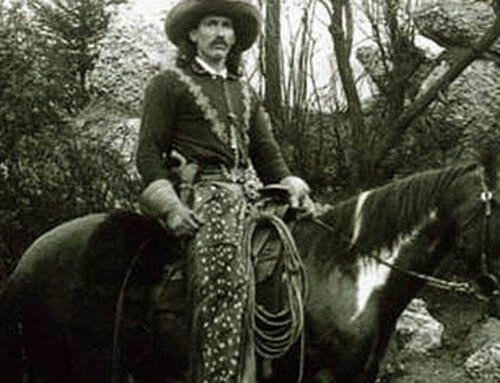Stagecoach robber Charles ‘Black Bart’ Boles
By western author Nick Brumby
“I’ve labored long and hard for bread,
For honor, and for riches,
But on my corns too long you’ve tread,
You fine-haired sons of bitches.”
— Stagecoach robber Black Bart, 1877
 For a man who wrote poetry, was deathly afraid of horses, and maintained an air of politeness and sophistication while robbing stagecoaches, Charles Boles seemed an unlikely choice as a highwayman.
For a man who wrote poetry, was deathly afraid of horses, and maintained an air of politeness and sophistication while robbing stagecoaches, Charles Boles seemed an unlikely choice as a highwayman.
With his luxuriant white mustache and gold watch chain, he seemed a model ‘gentleman bandit’, and looked every inch a successful San Francisco businessman.
But as ‘Black Bart’, Boles quickly became a legend. When rumors of a stylishly dressed man robbing stagecoaches and leaving poems behind at the scene of the crime hit newspapers in the late 1800s, Black Bart became an instant sensation.
He robbed Wells Fargo stagecoaches at least 28 times across northern California between 1875 and 1883, including several times along the historic Siskiyou Trail between California and Oregon.
And due to his phobia of horses, he always walked to and from the robbery sites. Black Bart’s first robbery netted him $160. Despite this slow start, Boles was quite successful and made off with thousands of dollars a year.
They don’t make bandits like they used to.
 Charles Earl Boles, AKA ‘Black Bart’ was born in England in 1829 before his family emigrated to New York two years later. In 1849, he joined the California Gold Rush and spent years prospecting before settling in Illinois. During the Civil War, he joined an Illinois regiment and was a good soldier, being promoted to lieutenant before his discharge in 1865.
Charles Earl Boles, AKA ‘Black Bart’ was born in England in 1829 before his family emigrated to New York two years later. In 1849, he joined the California Gold Rush and spent years prospecting before settling in Illinois. During the Civil War, he joined an Illinois regiment and was a good soldier, being promoted to lieutenant before his discharge in 1865.
After the war, Boles returned to prospecting for gold, but in 1871 had a run in with Wells Fargo agents that left him vowing vengeance. He proceeded to exact his revenge by changing his name to ‘Black Bart’ and pillaging Wells Fargo stagecoaches up and down the west coast of the United States.
Boles chose his ‘bandit identity’ when writing his first poem. It likely came from a dime novel, “The Case of Summerfield”, published in the Sacramento Union newspaper in the early 1870s. The villain of that story (which can be read in full on the Project Gutenberg website) is a stagecoach robber named Black Bart.
Stagecoaches transporting cash and gold made a tempting target for bandits, as drivers found out when confronted by the barrel of a shotgun poking out from a nearby bush.
Black Bart’s robbery method was simple. He was viewed as a ‘gentleman bandit’ because of his politeness and air of sophistication. He robbed on foot, wielding a double-barreled shotgun and clad in a linen duster and bowler hat, his face concealed by a flour sack with eyeholes cut into it. He would lie in wait for a stagecoach to pass and then jump out with shotgun in hand. When the driver stopped, (to avoid being shot) the ‘gentleman bandit’ would demand all the money and gold on board.
Black Bart never fired his weapon and sometimes left behind handwritten poems. The first is at the top of this article; the second is below, left at the site of his July 25, 1878, holdup of a stage traveling from Quincy to Oroville, California:
“Here I lay me down to sleep
To wait the coming morrow,
Perhaps success, perhaps defeat,
And everlasting sorrow.
Let come what will, I’ll try it on,
My condition can’t be worse;
And if there’s money in that box
‘Tis munny in my purse.”
— Black Bart
His string of hold ups grew longer, but they occurred at unpredictable intervals. Sometimes months would pass between his robberies, once he struck two stages within 24 hours, at two places 30 miles apart.
 He robbed Wells Fargo stagecoaches at least 28 times across northern California between 1875 and 1883, including several times along the historic Siskiyou Trail between California and Oregon.
He robbed Wells Fargo stagecoaches at least 28 times across northern California between 1875 and 1883, including several times along the historic Siskiyou Trail between California and Oregon.
While he did not use horses, Black Bart had another edge – he was a supreme walker, capable of covering great distances quickly on foot. He never stopped overnight within 12 miles of the scene of a robbery. Once, trackers followed him through 60 miles of wilderness before they lost his trail.
Holdups became so commonplace in the West that Wells. Fargo printed up a standard form for use as a ‘stage robbery report’ with blanks for the agent to fill in the details.
Wells, Fargo unleashed a team of detectives to track down Black Bart. but perhaps ironically it was a laundry service that called time on his career as a highway bandit.

Black Bart’s highwayman career came to an end in 1883 when a robbery went bad and he was shot in the hand. He dropped a handkerchief bearing a marking from a laundry in San Francisco. Detectives connected it to him, and Charles ‘Black Bart’ Boles was taken into custody.
Throughout the trial, Boles declared his innocence. His demeanor so impressed the jury that the prosecution struggled to get a conviction. Eventually, Boles was sentenced to just six years in prison. A gentleman to the end, he was released for good behavior after four.
Upon his release in January 1888, Black Bart’s health had clearly deteriorated. He had visibly aged, his eyesight was failing, and he had gone deaf in one ear.
When asked if he would return to robbing stagecoaches, Bolles replied “No gentlemen, “I’m through with crime.” When asked if he would write more poetry, he replied, “Now didn’t you hear me say that I am through with crime?”
Black Bart did not return to his family. His last known whereabouts were a hotel in Visalia, California, He vanished a month after regaining his freedom. then disappeared, reportedly dying in New York.
* *
“Most stage robbers were hardened, uncouth ruffians who stole the Wells Fargo box, the mail, and anything of value carried by the driver and his passengers. This mysterious bandit was unique, given his polite and gentlemanly demeanor and the fact that he never robbed anyone aboard the stage.”
— John Boessenecker, author of ‘Gentleman Bandit’

About Nick Brumby
I like a good story. And of all stories, I love westerns the most.
As a kid, I spent far too many afternoons re-watching Clint Eastwood spaghetti westerns, picking up ‘Shane’ for just one more read, or saddling up beside Ben Cartwright when ‘Bonanza’ was on TV each afternoon.
I’m a former journalist and I love horses, dogs, and the occasional bourbon whiskey. I live with my wife, daughter and our ever-slumbering hound in a 1800’s-era gold mining town – our house is right on top of the last working gold mine in the area. There may not be much gold left, but there’s history wherever you look.
I hope you enjoy my westerns as much as I enjoyed writing them!
Happy trails,
Nick























